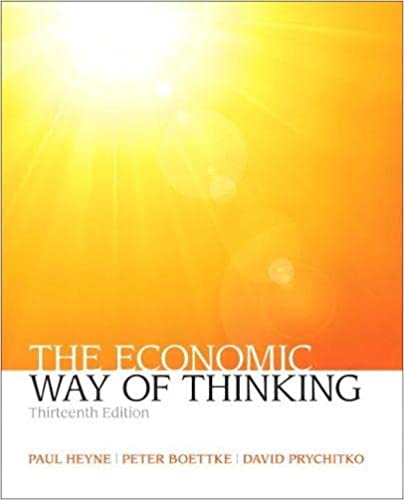
The Economic Way of Thinking 13th Edition by David Prychitko, Peter Boettke, Paul Heyne
Edition 13ISBN: 9780132992695
The Economic Way of Thinking 13th Edition by David Prychitko, Peter Boettke, Paul Heyne
Edition 13ISBN: 9780132992695 Exercise 17
From the opportunity-cost perspective, there is no difference between paying money and forgoing an opportunity to receive money. That does not fully accord, however, with a lot of our intuitions. Consider the following cases:
(a) Dave and Pete are friends. Dave asks Pete to lend him $1,000 for a year and Pete does so. Would it be proper for Pete to charge Dave interest on the loan if Pete himself had to borrow the money and pay interest? Would it be any less proper for Pete to charge Dave interest if he obtained the funds by cashing a certificate of deposit on which he had been earning interest?
(b) Friedrich bought a large painting by Turner that was on display at a major exhibition, but he had to agree not to take possession until the show ended six months later. When the show finally ended and Friedrich brought the painting home, he made two discoveries: The show had so increased Turner's prestige that the painting was now worth twice what he had paid for it, and the painting was too large to fit on any of his walls. Karl has larger walls in his home and would like to purchase the painting from his friend Friedrich. What is the proper price for Friedrich to charge Karl? What he himself paid for the painting or what he could now get for it if he put it on the market?
(a) Dave and Pete are friends. Dave asks Pete to lend him $1,000 for a year and Pete does so. Would it be proper for Pete to charge Dave interest on the loan if Pete himself had to borrow the money and pay interest? Would it be any less proper for Pete to charge Dave interest if he obtained the funds by cashing a certificate of deposit on which he had been earning interest?
(b) Friedrich bought a large painting by Turner that was on display at a major exhibition, but he had to agree not to take possession until the show ended six months later. When the show finally ended and Friedrich brought the painting home, he made two discoveries: The show had so increased Turner's prestige that the painting was now worth twice what he had paid for it, and the painting was too large to fit on any of his walls. Karl has larger walls in his home and would like to purchase the painting from his friend Friedrich. What is the proper price for Friedrich to charge Karl? What he himself paid for the painting or what he could now get for it if he put it on the market?
Explanation
Opportunity Cost refers to the benefit o...
The Economic Way of Thinking 13th Edition by David Prychitko, Peter Boettke, Paul Heyne
Why don’t you like this exercise?
Other Minimum 8 character and maximum 255 character
Character 255


